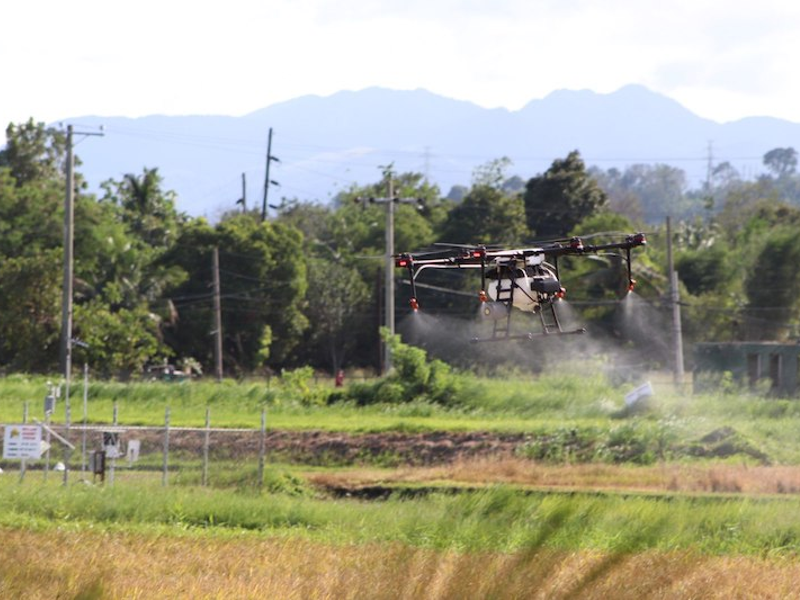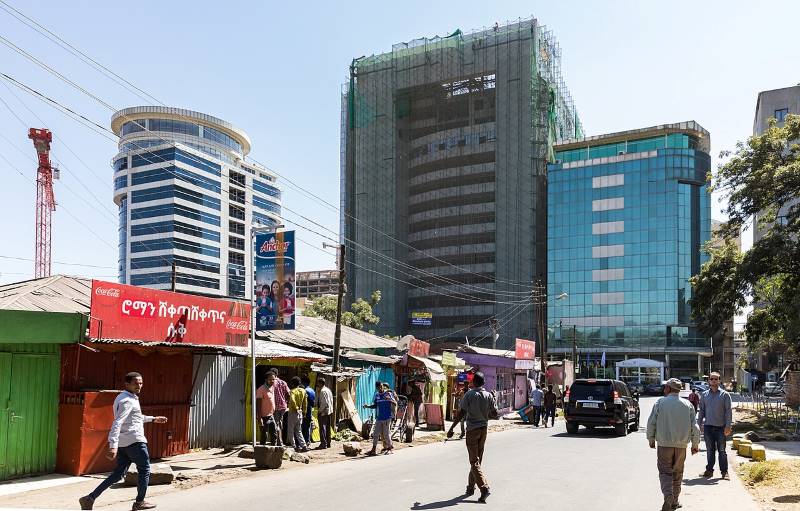Agricultural drone testing at the International Rice Research Institute (IRRI) (Indonesia). Source: Wikimedia Commons
Agriculture has remained a vital contributor to the economies of many African nations. According to Statista (a global data and business intelligence platform), in 2022, the top 5 countries of Sierra Leone, Ethiopia, Niger, Mali, and Comoros recorded a 50% – 30% contribution of Agriculture to their GDP.
While the agricultural sector in African economies is a source of livelihood for many of its people, it is the least developed compared to the output from other continents. Despite the availability of arable lands, the continued reliance on traditional farming methods has only contributed to reducing land productivity and attracting more labor into the sector.
With a rapidly increasing population and threats of food shortage due to the impacts of climate change, countries all over the world including Africa are turning to smart farming methods to improve food production and introduce best agricultural practices.
What is Smart Farming? Also referred to as precision agriculture, smart farming refers to using technological tools to improve the quantity and quality of agricultural products while enhancing the human labor process. These tools that are accessible for smart farming include drones, sensors, robots, various technological applications, and agricultural software.
Using the Internet of Things, farmers can combine all these tools and solutions into a system that exchanges information, provides solutions, and performs specific tasks based on data which ultimately improves technology and minimizes waste.
A lot of agricultural activity in Africa is carried out on a seasonal basis. This means the planting of specific crops can only be done at a period of the year. Without accurate data on temperature changes, farmers can miss out on planting season opportunities.
The use of sensors in preparation for planting can provide farmers with data on soil moisture, and nutrient levels. Sensors can also provide data on weather temperature what crops are suitable for a specific period, where they should be planted, and what is needed to care for such crops.
Drones play a critical role in sustaining the health of the crops. Equipped with pesticides, drones can be deployed across vast fields to tackle pests. Equipped with cameras, drones can also be used to assess crop performance and identify nutrient-deficient or diseased plants, and other crop problems. They can also serve as security tools to curtail praedial larceny (crop theft) which is a negative practice impacting the agricultural sector in Africa.

Farming in Ethiopia. Source: Wikimedia Commons
By reducing the man hours spent combing the farmland, and exposure of farmers to pesticides, drones can help farmers get a better view of their crop performance, reduce losses as well and improve productivity.
Robots operating as small unmanned vehicles can rummage through the fields spraying chemicals to kill off weeds or also spread seeds in specific areas under planned spacing. They can also be mounted with cameras to provide a ground view of the field that might not be accessible to the drone.
Where there is a shortage of labor, these robots are not only a good addition to the smart tools African farmers can use for their activities, but they are not encumbered by any form of sickness or workplace injuries.
Applications and software can provide valuable crop information to the mobile device or any other connected devices of the farmer. This would assist the farmer in making a proper planting plan or sending information to experts or partners who would proffer effective solutions to challenges based on the data received.
Smart farming will continue to be a revolutionary way to increase agricultural activities. More African countries must take the initiative to do away with the traditional farming methods and embrace the technological revolutions associated with smart farming if they intend to be a major player in the agriculture global economy, improve their GDP, secure a sustainable future for their farmers, and also ensure food security for their expanding population.

Okechukwu Nzeribe works with the Onitsha Chamber of Commerce, in Anambra State, Nigeria, and loves unveiling the richness of African cultures. nextquestservices@gmail.com





